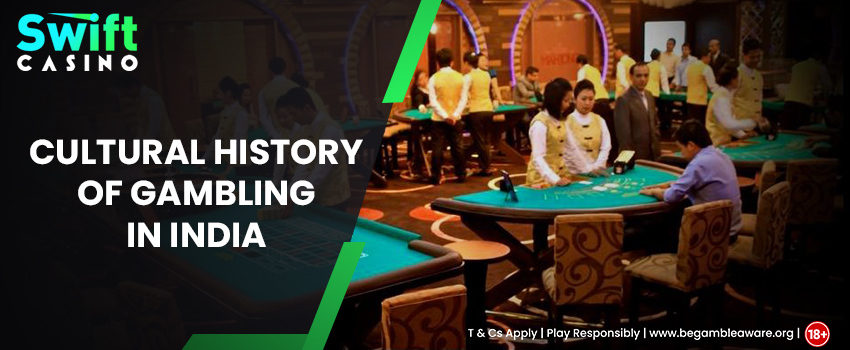Gambling is inscribed in a larger part of the rich cultural history of India and has a much deeper connection towards the root of the nation than most people’s understanding. It is not simply a past-time activity that originated within the people of India, but instead, it is a culturally engraved activity written down in some Indian epics like Ramayana and Mahabharatha. It is believed that the activity has been a part of the Indian epic script Ramayana. People think it dates back to 7300 BC, although it has been ascribed to 430 BC. The history book of Ramayana has accounts on both the dice game and chess, which are classified as board games.
In the Sanskrit epic of Ramayana, the perspective regarding gambling is quite distinct in which it is referenced nonchalantly and is not encouraged, tabooed, nor outlawed. It is studied that the truth behind the origin of this game has many different layers across varied texts. The true downsides begin to emerge in the Mahabharata. This tale is thought to have originally been composed about 3200 BC, while other scholars consider it may have been penned as late as 120 BC or as just as 800 BC. The board game is referred to as Aksa, whereas every reference describes it as devana.
Initial Gambling Tools Used in India
Indians have a long prominent history with the gambling activity and within the course of time, the game has encountered several alterations within the kind of equipment used to gamble. It is believed that during old age people used to gamble with nuts that are taken from the Vibhitaka tree. This information is based on Buddhist texts that are from 300 BC. And as time passed by, the use of dice slowly diminished, with astragali replacing it. The game thus transformed itself into Passa. This point of time in India also witnessed people concentrating more towards animal gambling along with playing dice games. In this manner, the game had undergone several alterations and all these forms of gambling was seen as a part of Indian culture for a long period of time.
The Role of Gambling in Indian Epics
In one of the most worshipped epics of Indian history, the Mahabharata, one of the characters, Shakuni is seen cheating Yudhisthira while playing a dice game which resulted in the loss of kingdom and riches for the Pandavas. Shakuni is considered the smartest and crooked with brains that can take over anyone in gambling. He then forced his spouse and brother into captivity. Once the disagreement became too heated, a new dice game was requested. This proves that gambling is something that was a part of the culture of India way beyond modernisation and the activity has evolved itself to gain the stature of what it holds in society today.
Gambling began around ram battles and moved to bull battles. Horse racing evolved into a kind of wagering that offered delight to numerous Indians throughout history. Throughout antiquity, Indians gambled recklessly without realising what would happen the next day. Hindu mantras and writings forbade such things from the beginning of time. Westerners are always seen to be attributed with developing several of these fascinating activities and betting systems. Many consumers are unaware that certain gaming machines use Indian emblems and signs.
As a result, It can surely be said that Indians played just as important a part as everyone else in assisting and fostering a gaming frenzy. Even by the fifteenth century, the proliferation of gaming halls throughout India had begun to accelerate. For maintaining peace, the municipal legislation carefully regulated gaming establishments, ensuring that everyone received proper gaming and triumphed. Nevertheless, it wasn’t controlled to enrich the gamers, rather to encourage players to pay monthly debts for the ruler voluntarily. This also accounts that the Indians are responsible for starting gaming tax among people. India has also paved the way for the evolution of certain traditional gambling games like Teen Patti and Andar Bahar.
European Gaming Legislation and Their Impact
Regardless of the fact that India had an important part in historical gaming culture, Western culture eventually gained possession. Cricket developed since its introduction in the 17th century and eventually, it became one of the most followed activities to wager upon. The 18th century also marked the beginning of Horse racing as more Westerners began to transport horses to India. The Britishers used horses for transportation and because of the same reason the Indian land owned by the Britishers saw a huge surge in horses being transported to the land. They have also introduced some traditional western gambling games like Blackjack and Roulette to the Indian audience.
Once gaming became increasingly popular and beyond reach, the authorities enacted the Public Gambling Act in the year 1867, which rendered owning a betting establishment prohibited. Following that same time, this proposed Law included numerous adjustments and amendments, such as Paplu, which rendered Rummy lawful. Nonetheless, given the truth that a portion of the betting legislation is complicated and unusual, wagering remains prohibited in the country even to this day. India being a sovereign country, has different gambling laws under different jurisdictions.
Cricket Betting in India
The introduction of the game of cricket for the Indian community could be one of the things that the natives would be thankful for. Cricket has evolved as the most followed sport in the nation for a long period of time. It was in the 18th century that the Britishers brought the game of cricket across the borders to Indian land. The game then began to be closely linked to the culture of the country. India became a country where cricketers are treated as Gods, and the game itself was termed a religion. The market for cricket betting in the nation is also wide open because of the same reason that the game is being watched and followed by billions in the country.
Cricket opened the path for such popularity of betting in sports that is now exclusively offered worldwide. Whenever a game of cricket gets staged, Indians wager lakhs of rupees upon their favourite side that they believe in prevailing. All of those are favourable times for bettors. There seemed to be no limits and lots of possibilities. The celebration brought up an unexpected conclusion as the British seized control in the nation. They also prohibited all types of betting with the introduction of the 1867 Gambling Act. After that the interest for betting among people slowly began to diminish ultimately.
Such limitation was just in theory as the ban remained hardly long-lasting and was unable to prevent individuals from engaging in casino games, it got progressively further engaging and began to be utilised in lanes, highways, and areas including several gatherings. Considering its inhabitants, there remained a great market for betting, although state authorities seemed to have limited practical methods of interrogating, regulating, or implementing the ban. After 89 years of becoming ruled by the British, the nation of India was ultimately proclaimed sovereign in 1947. Nevertheless, the limits on betting also weren’t relaxed. The administration classifies betting like an obsession and a factor that could result in many problems in the family.
India’s Current Gambling Legislation
The Public Gambling Act of India was legislated in the year of 1867. There has absolutely zero significant alteration in India after the initial gaming regulations became enacted. Many societies consider wagering to be a crime or perhaps forbidden. Such a viewpoint is reflected in government legislation. All seven union territories plus the 29 Indian state governments were granted the option and freedom to determine if they wanted to render betting lawful in their particular jurisdictions. Each region is given its own constituent assembly, with the administration having authority to enable whatever legislation on every topic. Many states under the Indian government consider betting as an act of crime and have declared it unlawful, although they do permit various types of betting, such as horse racing.
The Public Gambling Act was passed in the year 1867, is the ultimate legislation which is prevalent even after 155 years since its introduction. The legislation makes it unlawful to own or operate a betting establishment, irrespective of your identity. If someone is convicted of breaking the rules, he must incur a penalty or spend time in jail. The Public Gaming Act includes a provision outlining the penalty for patronising illicit betting establishments. The Law is applicable throughout India; however, regions such as Sikkim and Maharashtra permit wagering in facilities, with Goa being the most friendly state for wagering in India.
India forbids gambling in sports at facilities, particularly cricket. The Supreme Court ordered an investigation on the optimum strategy to combat unlawful gaming in the nation in 2016. It is hard to prevent illegal gambling in India but can be governed with utmost care. Due to the advancement of tech in India, numerous individuals may now acquire all virtual activities, including online casino and cricket betting. As a result of the ability to bet digitally, gambling activity is gaining more traction and has transformed itself into the most followed leisure activity in the country. With the introduction of online gambling and sports betting, the traditional roots have uplifted the spirits of gamers in India, with more people gaining access to bet from anywhere in the country.

